Anthony C. Chang, MD, MBA, MPH, MS
 Dr. Chang attended Johns Hopkins University for his B.A. in molecular biology prior to entering Georgetown University School of Medicine for his M.D. He then completed his pediatric residency at Children’s Hospital National Medical Center and his pediatric cardiology fellowship at the Children’s Hospital of Philadelphia. He then accepted a position as attending cardiologist in the cardiovascular intensive care unit of Boston Children’s Hospital and as assistant professor at Harvard Medical School.
Dr. Chang attended Johns Hopkins University for his B.A. in molecular biology prior to entering Georgetown University School of Medicine for his M.D. He then completed his pediatric residency at Children’s Hospital National Medical Center and his pediatric cardiology fellowship at the Children’s Hospital of Philadelphia. He then accepted a position as attending cardiologist in the cardiovascular intensive care unit of Boston Children’s Hospital and as assistant professor at Harvard Medical School.
He has been the medical director of several pediatric cardiac intensive care programs (including Children’s Hospital of Los Angeles, Miami Children’s Hospital, and Texas Children’s Hospital). He served as the medical director of the Heart Institute at CHOC.
He is currently the Chief Intelligence and Innovation Officer (CIIO) and Medical Director of the Heart Failure Program at CHOC Hospital in Orange. He has also been named a Physician of Excellence by the Orange County Medical Association and Top Cardiologist, Top Doctor for many years as well as one of the nation’s Top Innovators in Healthcare.
He has completed a Masters in Business Administration (MBA) in Health Care Administration at the University of Miami School of Business and graduated with the McCaw Award of Academic Excellence. He also completed a Masters in Public Health (MPH) in Health Care Policy at the Jonathan Fielding School of Public Health of the University of California, Los Angeles and graduated with the Dean’s Award for Academic Excellence. He later taught Global Health there. Finally, he graduated with his Masters of Science (MS) in Biomedical Data Science with a subarea focus in artificial intelligence from Stanford School of Medicine and has completed a certification on artificial Intelligence from MIT. He is a computer scientist-in-residence and a member of the Dean’s Scientific Council at Chapman University.
He has helped to build a successful cardiology practice as a startup company and was able to complete a deal on Wall Street. He is known for several innovations in pediatric cardiac care, including introducing the cardiac drug milrinone and co-designing (with Dr. Michael DeBakey) an axial-type ventricular assist device in children. He is a committee member of the National Institute of Health pediatric grant review committee. He is the editor of several textbooks in pediatric cardiology, including Pediatric Cardiac Intensive Care, Heart Failure in Children and Young Adults , and Pediatric Cardiology Board Review.
He is the founder of the Pediatric Cardiac Intensive Care Society (PCICS) that launched the multi-disciplinary focus on cardiac intensive care for children. He is also the founder of the Asia-Pacific Pediatric Cardiac Society (APPCS) , which united pediatric cardiologists and cardiac surgeons from 24 Asian countries and launched a biennial meeting in Asia that now draws over 1,000 attendees.
He is the founder and medical director of the Medical Intelligence and Innovation Institute (MI3) that is supported by the Sharon Disney Lund Foundation. The institute is dedicated to implement data science and artificial intelligence in medicine and is the first institute of its kind in a hospital. The new institute is concomitantly dedicated to facilitate innovation in children and health care all over the world. He is the organizing chair for the biennial Pediatrics2040: Emerging Trends and Future Innovations meeting as well as the founder and director of the Medical Intelligence and Innovation Summer Internship Program, which mentors close to 100 young physicians-to-be every summer. He has organized a pediatric innovation leadership group called the International Society for Pediatric Innovation (iSPI).
He intends to build a clinician-computer scientist interface to enhance all aspects of data science and artificial intelligence in health and medicine. He currently lectures widely on big data and artificial intelligence in medicine (he has been called “Dr. A.I.” by the Chicago Tribune and has given a TEDx talk as well as on the Singularity University faculty ) ( [1] ). He has published review papers on big data and predictive analytics as well as machine learning and artificial intelligence in medicine ( [2] )( [3] ). He has completed a book project with a book series with Elsevier: Intelligence-Based Medicine: Principles and Applications of Artificial Intelligence in Clinical Medicine and Health Care and is the editor-in-chief of the journal of the same title. He is the founder and organizing chair of many Artificial Intelligence in Medicine (AI Med) meetings in the U.S. and abroad (Europe and Asia) that will focus on artificial intelligence in healthcare and medicine (www.ai-med.io). He intends to start a new group for clinicians with a special focus on data science and artificial intelligence as Medical Intelligence Society, or MIS . Finally, he is the dean of the nascent American Board of Artificial Intelligence in Medicine (ABAIM) that will have education and certification of artificial intelligence in clinical medicine and health care as its mission.
He is the founder of three startup companies in artificial intelligence in medicine:
- CardioGenomic Intelligence (CGI), LLC is a multifaceted company that focuses on artificial intelligence applications such as deep learning in clinical cardiology (cardiomyopathy and heart failure as well as other cardiovascular disease) and genomic medicine.
- Artificial Intelligence in Medicine (AIMed), LLC is an events company that organizes meetings and educational programs in artificial intelligence in medicine in local as well as global venues.
- Medical Intelligence 10 (MI10), LLC is an education and consulting/advising conglomerate for executives and physician leaders as well as investors for the evaluation and implementation of AI strategies in healthcare organizations, for evaluation and recommendation of AI in healthcare vendors, and assessment and implementation of cybersecurity in healthcare organizations.
Piyush Mathur MD, FCCM
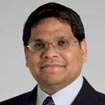 Dr. Mathur is a Staff Anesthesiologist and Critical Care physician at Cleveland Clinic, Ohio with more than 20 years of clinical experience. He is also the Quality Improvement Officer and Chair, Compliance Committee, Anesthesiology Institute, Cleveland Clinic. After completing his medical school training from Armed Forces Medical College (AFMC, Pune, India), he completed residency in Anesthesiology and fellowship in both, Critical Care and Quality at Cleveland Clinic. He is the past program director of the anesthesiology critical care fellowship program at Cleveland Clinic. A recognized leader in critical care, quality, education and artificial intelligence applications in healthcare, he has led many of the local and national programs including serving as the chair of the postgraduate education committee, coding and documentation education committee of the Society of Critical Care Medicine (SCCM). He is currently a member of CPT editorial advisory committee,AMA (American Medical Association).Trained in computer programming, machine learning and deep learning, he is the founder of BrainX, an AI in healthcare application research and development company. He also founded one of the largest groups for machine learning in healthcare, BrainX Community.
Dr. Mathur is a Staff Anesthesiologist and Critical Care physician at Cleveland Clinic, Ohio with more than 20 years of clinical experience. He is also the Quality Improvement Officer and Chair, Compliance Committee, Anesthesiology Institute, Cleveland Clinic. After completing his medical school training from Armed Forces Medical College (AFMC, Pune, India), he completed residency in Anesthesiology and fellowship in both, Critical Care and Quality at Cleveland Clinic. He is the past program director of the anesthesiology critical care fellowship program at Cleveland Clinic. A recognized leader in critical care, quality, education and artificial intelligence applications in healthcare, he has led many of the local and national programs including serving as the chair of the postgraduate education committee, coding and documentation education committee of the Society of Critical Care Medicine (SCCM). He is currently a member of CPT editorial advisory committee,AMA (American Medical Association).Trained in computer programming, machine learning and deep learning, he is the founder of BrainX, an AI in healthcare application research and development company. He also founded one of the largest groups for machine learning in healthcare, BrainX Community.
Presentation: Moderator and Clinical NLP Workshop
Robert Hoyt, MD
 Dr. Hoyt received his undergraduate education at the University of Virginia and his medical education at Virginia Commonwealth University. While still on active duty in the US Navy he became involved with multiple implementations of health information technology. As a result of this experience and additional education at Stanford University, he created a Medical (Health) Informatics program at the University of West Florida in 2004. He noted early on that there were no current and practical textbooks on the subject, so he launched Health Informatics: Practical Guide in 2007. The seventh edition was published in 2018 and he just released his latest textbook Introduction to Biomedical Data Science in late 2019.
Dr. Hoyt received his undergraduate education at the University of Virginia and his medical education at Virginia Commonwealth University. While still on active duty in the US Navy he became involved with multiple implementations of health information technology. As a result of this experience and additional education at Stanford University, he created a Medical (Health) Informatics program at the University of West Florida in 2004. He noted early on that there were no current and practical textbooks on the subject, so he launched Health Informatics: Practical Guide in 2007. The seventh edition was published in 2018 and he just released his latest textbook Introduction to Biomedical Data Science in late 2019.
Dr. Hoyt has also been involved with clinical and informatics research over the past decade and he has published and lectured extensively in these areas. He is a reviewer for multiple medical and informatics journals He became board certified in Clinical Informatics in 2015 and a Fellow of the American Medical Informatics Association in 2019.
Presentation: Moderator and “So You Want to Be A Data Scientist – Bring a Large Toolkit”
John S. Lee, MD
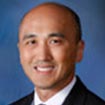 Dr. Lee is an emergency physician and informaticist. He became chief medical information officer of Edward-Elmhurst Healthcare in 2013 and most recently moved to Allegheny Health Network as their chief medical information officer in July of this year. He continues to practice medicine and sees patients in the emergency department. He is a true believer that the biggest problem that faces our healthcare system is the inefficient delivery of data, information and knowledge. He also believes it is our biggest opportunity and our current landscape presents a unique confluence of needs and technology to use artificial intelligence and data science to transform our national healthcare system.
Dr. Lee is an emergency physician and informaticist. He became chief medical information officer of Edward-Elmhurst Healthcare in 2013 and most recently moved to Allegheny Health Network as their chief medical information officer in July of this year. He continues to practice medicine and sees patients in the emergency department. He is a true believer that the biggest problem that faces our healthcare system is the inefficient delivery of data, information and knowledge. He also believes it is our biggest opportunity and our current landscape presents a unique confluence of needs and technology to use artificial intelligence and data science to transform our national healthcare system.
Presentation: Moderator
Hoang Nguyen, MD MSCR MSCA
 Dr. Nguyen is a pediatric electrophysiologist and data scientist. He completed residency training in pediatrics and fellowship training in pediatric cardiology and pediatric electrophysiology at Washington University in St. Louis School of Medicine. Dr. Nguyen has a Master of Science in Clinical Research from Rush University and a Master of Science in Analytics from the University of Chicago. Dr. Nguyen’s research has focused on congenital heart disease, sudden death in Rett syndrome, and the application of machine learning and deep learning in healthcare analytics.
Dr. Nguyen is a pediatric electrophysiologist and data scientist. He completed residency training in pediatrics and fellowship training in pediatric cardiology and pediatric electrophysiology at Washington University in St. Louis School of Medicine. Dr. Nguyen has a Master of Science in Clinical Research from Rush University and a Master of Science in Analytics from the University of Chicago. Dr. Nguyen’s research has focused on congenital heart disease, sudden death in Rett syndrome, and the application of machine learning and deep learning in healthcare analytics.
Narinder Singh, MD
 A/Professor Narinder Singh is the Chief of Otolaryngology, Head & Neck Surgery at Westmead Hospital, Sydney (Australia’s largest hospital complex) and Clinical Associate Professor at The University of Sydney (Australia’s oldest and largest Medical School). He specialises in rhinology, anterior skull base surgery, rhinoplasty and OSA surgery. Prof Singh trained in Sydney, Australia. He was awarded a fully-funded three year fellowship at Guy’s and St Thomas’ Hospitals, London. Prof Singh completed his Thesis on “Allergen specific cytokine production by cells derived from human nasal polyps” through the labs at King’s College, London. He has received multiple research grants including The Garnett Passe and Rodney Williams Foundation Conjoint Grant and Grant-in-aid, The University of Sydney John Moore Scholarship and Vernon Barling Fellowship. Prof Singh’s early use of computer technology in surgery led to his team’s extensive research work in CFD (Computational Fluid Dynamics) and AI (Artificial Intelligence). Prof Singh’s team is currently working on multiple AI algorithms to interpret radiology and audiometry images, as well as an AI-based smartphone app to treat severe ear disease in Indigenous children in rural and remote Australia. Prof Singh convened the First Australian Congress of the Society for AI in Medicine, Surgery and Healthcare (AMSAH – www.amsah.org) in Sydney, 2019, as well as the First World Congress of the Society for CFD (Computational Fluid Dynamics) of the Nose and Airway (SCONA – www.scona.org) in London, UK, 2018 and Chicago, USA, 2019.
A/Professor Narinder Singh is the Chief of Otolaryngology, Head & Neck Surgery at Westmead Hospital, Sydney (Australia’s largest hospital complex) and Clinical Associate Professor at The University of Sydney (Australia’s oldest and largest Medical School). He specialises in rhinology, anterior skull base surgery, rhinoplasty and OSA surgery. Prof Singh trained in Sydney, Australia. He was awarded a fully-funded three year fellowship at Guy’s and St Thomas’ Hospitals, London. Prof Singh completed his Thesis on “Allergen specific cytokine production by cells derived from human nasal polyps” through the labs at King’s College, London. He has received multiple research grants including The Garnett Passe and Rodney Williams Foundation Conjoint Grant and Grant-in-aid, The University of Sydney John Moore Scholarship and Vernon Barling Fellowship. Prof Singh’s early use of computer technology in surgery led to his team’s extensive research work in CFD (Computational Fluid Dynamics) and AI (Artificial Intelligence). Prof Singh’s team is currently working on multiple AI algorithms to interpret radiology and audiometry images, as well as an AI-based smartphone app to treat severe ear disease in Indigenous children in rural and remote Australia. Prof Singh convened the First Australian Congress of the Society for AI in Medicine, Surgery and Healthcare (AMSAH – www.amsah.org) in Sydney, 2019, as well as the First World Congress of the Society for CFD (Computational Fluid Dynamics) of the Nose and Airway (SCONA – www.scona.org) in London, UK, 2018 and Chicago, USA, 2019.
Presentation: “Solving Paediatric Indigenous Ear Disease in Rural and Remote Australia With a Smartphone-Based AI Algorithm”
Dr. Tavpritesh Sethi
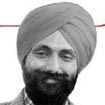 Dr. Sethi is a Clinician-Data Scientist and an Assistant Professor in the Department of Computational Biology and Infosys Center for Artificial Intelligence at IIIT-Delhi. He received hisM.B.B.S from Government Medical College, Amritsar and PhD from CSIR-Institute of Genomics and Integrative Biology, New Delhi, India. He has been a Visiting Faculty member at StanfordUniversity, Department of Biomedical Informatics (now Biomedical Data Sciences) where he served for two years from February 2017 to January 2019. Tavpritesh is also a Kavli Fellow(National Academy of Sciences, United States) and a fellow of the Wellcome Trust/DBT IndiaAlliance at AIIMS, New Delhi. He is one of the few Clinician Data-scientists in the country with a deep expertise and wide experience of creating AI/ML and Data Science solutions for Clinical andPublic Health. He has contributed to Data Science solutions in Critical Care, Infectious Diseases,Genomics, Public Health policy, and recently in COVID. His work in Biomedical Data Science has been published in top-tier peer reviewed journals and conferences and he has delivered several international Keynote addresses and talks at reputed venues including the WHO. He serves as an academic editor for PLOS One, Nature Scientific Reports, Systems Medicine and Journal of Genetics. Tavpritesh also serves as the Faculty lead for Entrepreneurship at IIIT-Delhi and keenlypromotes the creation of value and real-life solutions from IT research including Biomedical DataScience. He is a member of the Technical Innovation Group assisting the Govt. of Delhi in theCOVID response and serves on several committees for Data Science and AI/ML expertise in healthcare. Dr Tavpritesh Sethi | https://twitter.com/Tavpritesh
Dr. Sethi is a Clinician-Data Scientist and an Assistant Professor in the Department of Computational Biology and Infosys Center for Artificial Intelligence at IIIT-Delhi. He received hisM.B.B.S from Government Medical College, Amritsar and PhD from CSIR-Institute of Genomics and Integrative Biology, New Delhi, India. He has been a Visiting Faculty member at StanfordUniversity, Department of Biomedical Informatics (now Biomedical Data Sciences) where he served for two years from February 2017 to January 2019. Tavpritesh is also a Kavli Fellow(National Academy of Sciences, United States) and a fellow of the Wellcome Trust/DBT IndiaAlliance at AIIMS, New Delhi. He is one of the few Clinician Data-scientists in the country with a deep expertise and wide experience of creating AI/ML and Data Science solutions for Clinical andPublic Health. He has contributed to Data Science solutions in Critical Care, Infectious Diseases,Genomics, Public Health policy, and recently in COVID. His work in Biomedical Data Science has been published in top-tier peer reviewed journals and conferences and he has delivered several international Keynote addresses and talks at reputed venues including the WHO. He serves as an academic editor for PLOS One, Nature Scientific Reports, Systems Medicine and Journal of Genetics. Tavpritesh also serves as the Faculty lead for Entrepreneurship at IIIT-Delhi and keenlypromotes the creation of value and real-life solutions from IT research including Biomedical DataScience. He is a member of the Technical Innovation Group assisting the Govt. of Delhi in theCOVID response and serves on several committees for Data Science and AI/ML expertise in healthcare. Dr Tavpritesh Sethi | https://twitter.com/Tavpritesh
Presentation: “Building AI that Speaks to Clinicians”
Leo Anthony Celi MD MS MPH
 Dr. Celi is a principal research scientist at Massachusetts Institute of Technology, an associate professor at Harvard Medical School (part-time), and an instructor for the Department of Biostatistics at Harvard T.H. Chan School of Public Health. As clinical research director and principal research scientist at the MIT Laboratory for Computational Physiology (LCP), and as a practicing intensive care unit (ICU) physician at the Beth Israel Deaconess Medical Center (BIDMC), Leo brings together clinicians and data scientists to support research using data routinely collected in the process of care. His group built and maintains the publicly-available Medical Information Mart for Intensive Care (MIMIC) database and the Philips-MIT eICU Collaborative Research Database, with more than 13,000 users from around the world. The MIMIC-III paper has been cited more than 1500 times since 2016. In addition, Leo is one of the course directors for HST.936 – global health informatics to improve quality of care, and HST.953 – collaborative data science in medicine, both at MIT. He is an editor of the textbook for each course, both released under an open access license. “Secondary Analysis of Electronic Health Records” has been downloaded more than 500,000 times, and has been translated to Mandarin, Spanish and Korean. Finally, Leo has spoken in more than 35 countries across 6 continents about the value of data and learning in health systems.
Dr. Celi is a principal research scientist at Massachusetts Institute of Technology, an associate professor at Harvard Medical School (part-time), and an instructor for the Department of Biostatistics at Harvard T.H. Chan School of Public Health. As clinical research director and principal research scientist at the MIT Laboratory for Computational Physiology (LCP), and as a practicing intensive care unit (ICU) physician at the Beth Israel Deaconess Medical Center (BIDMC), Leo brings together clinicians and data scientists to support research using data routinely collected in the process of care. His group built and maintains the publicly-available Medical Information Mart for Intensive Care (MIMIC) database and the Philips-MIT eICU Collaborative Research Database, with more than 13,000 users from around the world. The MIMIC-III paper has been cited more than 1500 times since 2016. In addition, Leo is one of the course directors for HST.936 – global health informatics to improve quality of care, and HST.953 – collaborative data science in medicine, both at MIT. He is an editor of the textbook for each course, both released under an open access license. “Secondary Analysis of Electronic Health Records” has been downloaded more than 500,000 times, and has been translated to Mandarin, Spanish and Korean. Finally, Leo has spoken in more than 35 countries across 6 continents about the value of data and learning in health systems.
Keynote Presentation: “Data and Analytics for Global Health”
Research has been traditionally viewed as a purely academic undertaking, especially in limited-resource settings. Clinical trials, the hallmark of medical research, are expensive to perform, and take place primarily in countries which can afford them. Around the world, the blood pressure thresholds for hypertension, or the blood sugar targets for patients with diabetes, are established based on research performed in a handful of countries. There is an implicit assumption that the findings and validity of studies carried out in the US and other Western countries generalize to patients around the world. Learning using data science tools is the best medicine for population health, and that research should be an integral part of global health operations. Every patient encounter is an opportunity that we can learn from, and every healthcare provider should be a contributor and a custodian, and not merely a passive recipient, of the medical knowledge system.
Francisco Lopez-Jimenez, MD
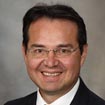 Dr. Lopez-Jimenez is a Professor of Medicine at Mayo College of Medicine, the chair of the Division of Preventive Cardiology and the Co-Director of Artificial Intelligence in Cardiology at Mayo Clinic. Dr. Lopez-Jimenez did his cardiology fellowship at Mount Sinai Medical Center in Miami, Florida and at Brigham and Women’s Hospital, Harvard Medical School. He trained in preventive cardiology at the VA Boston Healthcare System and Harvard Medical School and holds a Master’s of Science from Harvard School of Public Health and a MBA degree from Augsburg University. He was the Program Director for the first CME course focused on artificial intelligence in Cardiology organized by Mayo Clinic in July of 2019. The artificial intelligence program in cardiology at Mayo Clinic has been very productive publishing several articles in the last 12 months primarily using ECG signals, but has extended to outcome-based machine learning and image processing. He has published more than 240 scientific publications, including invited editorials in journals like Lancet, and his scientific work has been cited more than 5000 times. He was a guest speaker at the Global Submit on Circulatory Health Focused on Digital Health and AI in 2019, a meeting organized by the World Heart Federation to determine the next steps national and international organizations need to take to develop, implement, scale and regulate artificial intelligence related to cardiovascular diseases.
Dr. Lopez-Jimenez is a Professor of Medicine at Mayo College of Medicine, the chair of the Division of Preventive Cardiology and the Co-Director of Artificial Intelligence in Cardiology at Mayo Clinic. Dr. Lopez-Jimenez did his cardiology fellowship at Mount Sinai Medical Center in Miami, Florida and at Brigham and Women’s Hospital, Harvard Medical School. He trained in preventive cardiology at the VA Boston Healthcare System and Harvard Medical School and holds a Master’s of Science from Harvard School of Public Health and a MBA degree from Augsburg University. He was the Program Director for the first CME course focused on artificial intelligence in Cardiology organized by Mayo Clinic in July of 2019. The artificial intelligence program in cardiology at Mayo Clinic has been very productive publishing several articles in the last 12 months primarily using ECG signals, but has extended to outcome-based machine learning and image processing. He has published more than 240 scientific publications, including invited editorials in journals like Lancet, and his scientific work has been cited more than 5000 times. He was a guest speaker at the Global Submit on Circulatory Health Focused on Digital Health and AI in 2019, a meeting organized by the World Heart Federation to determine the next steps national and international organizations need to take to develop, implement, scale and regulate artificial intelligence related to cardiovascular diseases.
Presentation: “Repurposing Old Tools Using Artificial Intelligence: The case of ECG”
Shraga Rottem M.D., D.Sc.
 Dr. Rottem is the co-inventor of the First High Frequency Transvaginal Probe (TVS) Nov. 1985, Technion, Israel. He established and directed the First TVS Clinic pioneering the use of TVS in the first trimester and in gynecology (1986-1991). The material of his TVS Clinic was the crucial source used to introduce TVS in the US, EU, and the rest of the world before immigrating to the US as Invited Expert (1992). He is also the co-author of the first book on Transvaginal Sonography (1987) and of a completely new TVS book in 1991. He introduced First Trimester Transient Nuchal Findings in Down Syndrome to Dr. Kypros Nicolaides of King’s College Hospital in London in 1988 (and reported it in the Lancet in 1989) and was Royal Society Guest Expert in First Trimester and Researcher to Prof. Stuart Campbell and Dr. Kypros Nicolaides (1991-1992). Dr. Rottem developed the diagnostic criteria of Ectopic Pregnancy and “Tubal Ring ” in PID in 1986 and the ultrasound lessons-based criteria used to diagnose Ovarian Cancer in 1989 and other pathologies used worldwide.
Dr. Rottem is the co-inventor of the First High Frequency Transvaginal Probe (TVS) Nov. 1985, Technion, Israel. He established and directed the First TVS Clinic pioneering the use of TVS in the first trimester and in gynecology (1986-1991). The material of his TVS Clinic was the crucial source used to introduce TVS in the US, EU, and the rest of the world before immigrating to the US as Invited Expert (1992). He is also the co-author of the first book on Transvaginal Sonography (1987) and of a completely new TVS book in 1991. He introduced First Trimester Transient Nuchal Findings in Down Syndrome to Dr. Kypros Nicolaides of King’s College Hospital in London in 1988 (and reported it in the Lancet in 1989) and was Royal Society Guest Expert in First Trimester and Researcher to Prof. Stuart Campbell and Dr. Kypros Nicolaides (1991-1992). Dr. Rottem developed the diagnostic criteria of Ectopic Pregnancy and “Tubal Ring ” in PID in 1986 and the ultrasound lessons-based criteria used to diagnose Ovarian Cancer in 1989 and other pathologies used worldwide.
He is the co-founder of ISUOG and Ultrasound in ObGyn/UOG Journal and was previously the director of ObGyn Ultrasound and Assoc Professor of ObGyn at the State University of New York (1992-1998). He is the founder and director of Ironfan-International Registry of Fetal Anomalies since 1993, NY, USA, which was relocated to Columbia University Medical Center in 1999. The Ironfan is an International Multi-Center Research Network and Database for Early Prenatal Diagnosis and Acquisition of Data in a Network Environment. He developed the Time-Oriented Classification of the Natural History of Fetal Anomalies Based on Ultrasound with over 500 types of malformations. He is the guest editor of three full Special Journal Issues on TVS and in First Trimester with most of the content from his own research group: JCU, Journal of Ultrasound in Medicine and UOG. He has authored over 150 publications, peer review abstracts, and chapters in books, lectured in 29 countries and conducted many hands-on TVS courses worldwide. He serves as PI for the grants on three Early Prenatal Diagnosis projects, co-PI at an Ovarian Cancer project and the co-PI at a Medical AI based system for DoD (Department of Defense, USA).
Dr. Rotten is also the founder and director of the First Artificial Intelligence in Fetal Medicine and Machine Learning Institute developed at the Audubon Biomedical Research Center of Columbia University Medical Center (project started in 2014). He is recognized as the inventor of The AI Based Early Screening System for Fetal CHDs and of CDS of Neonatal CHDs for remote hospitals and developing world, and of the AI based Automatic Error Reduction when Screening for CHDs and diagnosing other problems in pregnancy and of an In Silico Based Early Diagnostic System (diagnoses not existing otherwise). Additionally, he invented an intelligent system shortening the development of new drugs and of the length of FDA trials. He is the inventor of two biosensors and AI in Oncology and in another specialty. He has authored eight patents (three issued) and founded and financed three medical AI companies with over $6m from SBA, DoD, a Research Foundation and other sources.
Presentation: AI in Fetal Medicine
Liam McCoy, MD Candidate
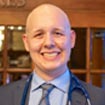 Liam is a third year medical student at the University of Toronto co-enrolled in an MSc in Health Systems Leadership and Innovation, with a focus upon preparing for the disruptive impacts of artificial intelligence in health systems contexts. As the co-director of the AI in Medicine Students’ Society, he has engaged in extensive advocacy around the inclusion of AI-related competencies and opportunities in medical education. In addition to completing the University of Toronto’s Computing for Medicine program, he has completed MSc practicums at the Vector Institute for Artificial Intelligence and the Massachusetts Institute of Technology Critical Data lab. His current projects include investigating the cross-context applicability of algorithmic clinical decision support tools, and exploring the potential for data science to act as an equity promoting force in medicine.
Liam is a third year medical student at the University of Toronto co-enrolled in an MSc in Health Systems Leadership and Innovation, with a focus upon preparing for the disruptive impacts of artificial intelligence in health systems contexts. As the co-director of the AI in Medicine Students’ Society, he has engaged in extensive advocacy around the inclusion of AI-related competencies and opportunities in medical education. In addition to completing the University of Toronto’s Computing for Medicine program, he has completed MSc practicums at the Vector Institute for Artificial Intelligence and the Massachusetts Institute of Technology Critical Data lab. His current projects include investigating the cross-context applicability of algorithmic clinical decision support tools, and exploring the potential for data science to act as an equity promoting force in medicine.
Presentation: Open Forum on AI Education
Amanda J. Naylor, MA
 Amanda is a second year student studying medicine and public health at Loyola University Chicago Stritch School of Medicine and Parkinson School of Public Health Sciences. Having spent several years as a research coordinator in anesthesiology, perioperative medicine, and orthopedic surgery, she has cultivated an interest in data science and healthcare research. Amanda is a 2020 Foundation for Anesthesia Education and Research medical student fellow and is involved in several student organizations at Stritch School of Medicine focused on learning data science techniques and conducting outreach programs in STEM for underprivileged students in the Chicago area.
Amanda is a second year student studying medicine and public health at Loyola University Chicago Stritch School of Medicine and Parkinson School of Public Health Sciences. Having spent several years as a research coordinator in anesthesiology, perioperative medicine, and orthopedic surgery, she has cultivated an interest in data science and healthcare research. Amanda is a 2020 Foundation for Anesthesia Education and Research medical student fellow and is involved in several student organizations at Stritch School of Medicine focused on learning data science techniques and conducting outreach programs in STEM for underprivileged students in the Chicago area.
Presentation: Open Forum on AI Education
Dr. Candace Makeda Moore, MD
 Dr. Moore is a data scientist and medical doctor with years of experience in industry and clinical medicine. She is also an editor for several resources of note to the medical community, namely Radiopaedia.org and WikiJournal of Medicine. A passionate advocate for global health who has volunteered with migrants and refugees in Europe and Israel, Dr. Moore tries to utilize her particular skills in technology which include not only computer programming but 3D printing towards medical science. She is currently working with communities in Ghana around issues of how medical technology innovation can improve health outcomes in the developing world context.
Dr. Moore is a data scientist and medical doctor with years of experience in industry and clinical medicine. She is also an editor for several resources of note to the medical community, namely Radiopaedia.org and WikiJournal of Medicine. A passionate advocate for global health who has volunteered with migrants and refugees in Europe and Israel, Dr. Moore tries to utilize her particular skills in technology which include not only computer programming but 3D printing towards medical science. She is currently working with communities in Ghana around issues of how medical technology innovation can improve health outcomes in the developing world context.
Presentation: Fairness in AI Algorithms
Bart Geerts, MD, MSc, PhD, MBA
 Bart Geerts is a multi-specialty physician, entrepreneur and researcher that aims to improve patient health and health care with artificial intelligence, mHealth and other med tech through empowerment and process optimization. His interests are to connect the right people and create synergistic solutions. Bart has over ten years of clinical experience as an anaesthetist, intensivist and clinical pharmacologist in the Netherlands and UK. He has managed a research group of more than ten scientists with a focus on medical technology and big data. Bart has years of corporate experience in pharma and AI. He has worked on several innovation projects in hospitals. Bart has a strong health care and government network. Bart has studied medicine (MD), biomedical sciences (MSc), intensive care medicine (PhD), and global business (MBA).
Bart Geerts is a multi-specialty physician, entrepreneur and researcher that aims to improve patient health and health care with artificial intelligence, mHealth and other med tech through empowerment and process optimization. His interests are to connect the right people and create synergistic solutions. Bart has over ten years of clinical experience as an anaesthetist, intensivist and clinical pharmacologist in the Netherlands and UK. He has managed a research group of more than ten scientists with a focus on medical technology and big data. Bart has years of corporate experience in pharma and AI. He has worked on several innovation projects in hospitals. Bart has a strong health care and government network. Bart has studied medicine (MD), biomedical sciences (MSc), intensive care medicine (PhD), and global business (MBA).
Presentation: “HPI Study”
Srinivas Mummadi, MD, MBI
 Dr. Mummadi or Sri (whichever is fine as per your liking) is a Staff Physician at the Respiratory Institute and Medical Director of Clinical Informatics, Cleveland Clinic Foundation, OH. He has formal training background and is board certified in Internal Medicine, Pulmonary and Critical Care Medicine, Clinical Informatics and Medical Quality. He has interests in using principles of informatics, big data analyses and AI to improve healthcare quality and outcomes. Clinical interests include obstructive lung disease and pleural disease.
Dr. Mummadi or Sri (whichever is fine as per your liking) is a Staff Physician at the Respiratory Institute and Medical Director of Clinical Informatics, Cleveland Clinic Foundation, OH. He has formal training background and is board certified in Internal Medicine, Pulmonary and Critical Care Medicine, Clinical Informatics and Medical Quality. He has interests in using principles of informatics, big data analyses and AI to improve healthcare quality and outcomes. Clinical interests include obstructive lung disease and pleural disease.
Presentation: “2019 ML in Healthcare: A Year in Review”
Aziz Nazha
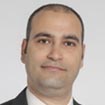 Dr. Nazha is the director of the Cleveland Clinic Center for Clinical Artificial Intelligence and an Associate Medical Director at Enterprise Analytics. He is also an Assistant Professor of Medicine at Lerner College of Medicine/Case Western Reserve University and an Associate Staff at the Department of Hematology and Medical Oncology at Taussig Cancer Institute, Cleveland Clinic.
Dr. Nazha is the director of the Cleveland Clinic Center for Clinical Artificial Intelligence and an Associate Medical Director at Enterprise Analytics. He is also an Assistant Professor of Medicine at Lerner College of Medicine/Case Western Reserve University and an Associate Staff at the Department of Hematology and Medical Oncology at Taussig Cancer Institute, Cleveland Clinic.
Dr. Nazha completed his Hematology and Medical Oncology fellowship at Cleveland Clinic and a Leukemia Fellowship at The University of Texas MD Anderson Cancer Center where he also served as an instructor in the Leukemia Department.
Dr. Nazha is nationally and internationally recognized expert in treating patients with leukemia. His research focuses on using artificial intelligence, machine learning, and deep learning to translate genomic and complex healthcare data into useful clinical tools that can improve patient outcomes. He is also a programmer and has developed multiple machine learning and deep learning models to improve the diagnosis, prognosis, and treatment options for patients with leukemia. He serves as a member of the NCCN guidelines for myelodysplastic syndromes. He is also a member of the International Working Group of MDS/MPN (IWG MDS/MPN), the International Working Group of myelodysplastic syndromes (IWG MDS) and a member in the acute and chronic leukemia committees at the Center for International Blood and Marrow Transplant Research. He is the recipient of several prestigious research awards including the NIH K12 Career Development Award, Future Leader in Hematology for Clinical Research Award, the James S. and Suzanne Cyrus Scholar Award Finalist, William E. Lower Non-Clinical Research Award, and the Peskind Memorial Award for Excellence in Scientific Research among many other teaching and service awards. He is also named in the list of 30 under 40 Leaders who are Transforming Healthcare by Business Insider.
Dr. Nazha has published more than 80 peer-reviewed manuscripts, review articles, and book chapters. He is on the editorial board of Journal of Clinical Oncology Clinical Informatics, Annals of Hematology & Oncology, Cancer Biology & Medicine, and Cancer Treatment and Research Communications. He is also an ad hoc reviewer for Journal of Clinical Oncology (JCO), JAMA Oncology, Leukemia, British Journal of Hematology, The Oncologist, and many others.
Dr. Nazha is a member of the American Society of Hematology, American Society of Clinical Oncology, American Association of Cancer Research, and the American Society of Physicians.
Presentation: Data and Analytics for Risk Assessment
Timothy Chou, Ph.D., FoA
 Dr. Chou has been one of the leaders in the move to cloud computing beginning with his role as the President of Oracle On Demand. He authored the book, “The End of Software” which predicted the rise of software as a service. He also started the first class on cloud computing, cs309a.stanford.edu at Stanford University. Over the past year he has built a team of experienced executives, current and former students, all sharing a vision of using software and data to fundamentally transform children’s healthcare.
Dr. Chou has been one of the leaders in the move to cloud computing beginning with his role as the President of Oracle On Demand. He authored the book, “The End of Software” which predicted the rise of software as a service. He also started the first class on cloud computing, cs309a.stanford.edu at Stanford University. Over the past year he has built a team of experienced executives, current and former students, all sharing a vision of using software and data to fundamentally transform children’s healthcare.
Presentation: “Cloud Computing and Edged AI”
Children’s healthcare today is disconnected. Healthcare machines are not connected; people are not connected; information is not connected. It reminds me of the world before the Internet. The pediatric cloud is a project to connect all 1,000,000 healthcare machines in all the children’s hospitals in the world. It’s a state of the art infrastructure designed from the ground up to be secure, private, high performance, reliable and engineered around 5G. With such an infrastructure we imagine there will be 1000s of applications ranging from simple collaboration to being the infrastructure for building AI doctors across many disciplines and changing children’s healthcare on the planet.
Dr. Tom Velez
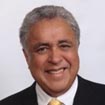 Dr. Velez is an accomplished entrepreneur, aerospace engineer, mathematician and computer scientist with over 40 years of experience in the development of complex technology-intensive systems in the aerospace, intelligence, military, and healthcare industries. His current interest and passion is directed at the effective utilization of advanced artificial intelligence systems technologies in support of outcomes-focused, patient-centered in-hospital critical care quality. His recent work, partially funded by NIH and DoD research grants and in partnership with leading healthcare institutions, is focused on bedside clinical decision support tools towards the improved management of infectious diseases and related life threatening complications (e.g. sepsis, ARDS). Tom received a B.S. in Mathematics from Iona College, M.S. in Mathematics and Computer Science from Adelphi University; Ph.D. in Applied Mathematics from Georgetown University and J.D., Magna Cum Laude from the University of Baltimore.
Dr. Velez is an accomplished entrepreneur, aerospace engineer, mathematician and computer scientist with over 40 years of experience in the development of complex technology-intensive systems in the aerospace, intelligence, military, and healthcare industries. His current interest and passion is directed at the effective utilization of advanced artificial intelligence systems technologies in support of outcomes-focused, patient-centered in-hospital critical care quality. His recent work, partially funded by NIH and DoD research grants and in partnership with leading healthcare institutions, is focused on bedside clinical decision support tools towards the improved management of infectious diseases and related life threatening complications (e.g. sepsis, ARDS). Tom received a B.S. in Mathematics from Iona College, M.S. in Mathematics and Computer Science from Adelphi University; Ph.D. in Applied Mathematics from Georgetown University and J.D., Magna Cum Laude from the University of Baltimore.
Presentation: “Agile Knowledge-based AI for Effective Clinical Decision Support (CDS) in the Era of COVID-19”
simple collaboration to being the infrastructure for building AI doctors across many disciplines and changing children’s healthcare on the planet.
Jai Nahar, MD, MBA
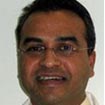 Dr. Nahar is a Clinical Associate Professor of Pediatrics at The George Washington University School of Medicine, and Faculty in the Division of Cardiology at Children’s National Hospital, Washington DC, focusing on Ambulatory pediatric cardiology. During his current tenure at Children’s National Heart Institute, he has helped in regional expansion and outreach of cardiology services (to complement the Telemedicine program) in North Western Maryland. He finished his MBA in Health Care Management from Johns Hopkins Carey Business School. He is also a member of American College of Cardiology’s Health Care Innovation Section leadership council, focusing on leveraging Artificial Intelligence and Advanced Analytics to improve cardiovascular care at individual patient and population level. He has a strong interest in Artificial Intelligence applications to health care delivery and promotion of Augmented Intelligence for physicians. His current focus is on innovations in the virtual health care delivery ecosystem using intelligent digital technologies.
Dr. Nahar is a Clinical Associate Professor of Pediatrics at The George Washington University School of Medicine, and Faculty in the Division of Cardiology at Children’s National Hospital, Washington DC, focusing on Ambulatory pediatric cardiology. During his current tenure at Children’s National Heart Institute, he has helped in regional expansion and outreach of cardiology services (to complement the Telemedicine program) in North Western Maryland. He finished his MBA in Health Care Management from Johns Hopkins Carey Business School. He is also a member of American College of Cardiology’s Health Care Innovation Section leadership council, focusing on leveraging Artificial Intelligence and Advanced Analytics to improve cardiovascular care at individual patient and population level. He has a strong interest in Artificial Intelligence applications to health care delivery and promotion of Augmented Intelligence for physicians. His current focus is on innovations in the virtual health care delivery ecosystem using intelligent digital technologies.
Presentation: Role of Medical Intelligence in Augmenting the Virtual Healthcare Delivery
Sandeep Reddy, MBBS, PhD, MSc, FAIDH, FAcadmTM, CHIA
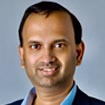 Sandeep is an Artificial Intelligence (AI) in Healthcare researcher based at the Deakin School of Medicine who also functions as a certified health informatician. He is a World Health Organisation recognised digital health expert and a Fellow of the Australasian Institute of Digital Health. He has a medical and healthcare management background and has completed machine learning/ health informatics training from various sources. He is currently engaged in research about the safety, quality and explainability of the application of AI in healthcare delivery in addition to developing AI models to treat and manage chronic diseases. Also, he has authored several articles and books about the use of AI in Medicine. Further, he has set up local and international forums to promote the use of AI in Healthcare in addition to sitting on various international committees focusing on AI in Healthcare.
Sandeep is an Artificial Intelligence (AI) in Healthcare researcher based at the Deakin School of Medicine who also functions as a certified health informatician. He is a World Health Organisation recognised digital health expert and a Fellow of the Australasian Institute of Digital Health. He has a medical and healthcare management background and has completed machine learning/ health informatics training from various sources. He is currently engaged in research about the safety, quality and explainability of the application of AI in healthcare delivery in addition to developing AI models to treat and manage chronic diseases. Also, he has authored several articles and books about the use of AI in Medicine. Further, he has set up local and international forums to promote the use of AI in Healthcare in addition to sitting on various international committees focusing on AI in Healthcare.
Presentation: “Explainability –A Cornerstone for AI Adoption in Medicine”
William W. Feaster, MD, MBA
 Dr. Feaster is Chief Health Information Officer at CHOC Hospital in Orange, California. In addition to supporting CHOC’s EMR, Dr. Feaster is now focused on applying analytic technologies to improve population health, as well as applying data science to healthcare. His clinical background includes Pediatrics, Anesthesia and Critical Care, but retired from clinical practice two years ago to focus his full-time efforts on his CHIO position.
Dr. Feaster is Chief Health Information Officer at CHOC Hospital in Orange, California. In addition to supporting CHOC’s EMR, Dr. Feaster is now focused on applying analytic technologies to improve population health, as well as applying data science to healthcare. His clinical background includes Pediatrics, Anesthesia and Critical Care, but retired from clinical practice two years ago to focus his full-time efforts on his CHIO position.
Presentation: Open Forum on Data Strategy
Teresa Rincon, RN, PhD, CCRN-K, FCCM
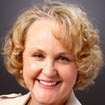 Interests include telemedicine, human factors & ergonomics, systems design, knowledge management theory, continuous quality improvement, development of clinical decision support systems (CDSS), data/information visualization, machine learning, and Big Data.
Interests include telemedicine, human factors & ergonomics, systems design, knowledge management theory, continuous quality improvement, development of clinical decision support systems (CDSS), data/information visualization, machine learning, and Big Data.
Presentation: Open Forum on Data Strategy

 Dr. Chang attended Johns Hopkins University for his B.A. in molecular biology prior to entering Georgetown University School of Medicine for his M.D. He then completed his pediatric residency at Children’s Hospital National Medical Center and his pediatric cardiology fellowship at the Children’s Hospital of Philadelphia. He then accepted a position as attending cardiologist in the cardiovascular intensive care unit of Boston Children’s Hospital and as assistant professor at Harvard Medical School.
Dr. Chang attended Johns Hopkins University for his B.A. in molecular biology prior to entering Georgetown University School of Medicine for his M.D. He then completed his pediatric residency at Children’s Hospital National Medical Center and his pediatric cardiology fellowship at the Children’s Hospital of Philadelphia. He then accepted a position as attending cardiologist in the cardiovascular intensive care unit of Boston Children’s Hospital and as assistant professor at Harvard Medical School. Dr. Mathur is a Staff Anesthesiologist and Critical Care physician at Cleveland Clinic, Ohio with more than 20 years of clinical experience. He is also the Quality Improvement Officer and Chair, Compliance Committee, Anesthesiology Institute, Cleveland Clinic. After completing his medical school training from Armed Forces Medical College (AFMC, Pune, India), he completed residency in Anesthesiology and fellowship in both, Critical Care and Quality at Cleveland Clinic. He is the past program director of the anesthesiology critical care fellowship program at Cleveland Clinic. A recognized leader in critical care, quality, education and artificial intelligence applications in healthcare, he has led many of the local and national programs including serving as the chair of the postgraduate education committee, coding and documentation education committee of the Society of Critical Care Medicine (SCCM). He is currently a member of CPT editorial advisory committee,AMA (American Medical Association).Trained in computer programming, machine learning and deep learning, he is the founder of BrainX, an AI in healthcare application research and development company. He also founded one of the largest groups for machine learning in healthcare, BrainX Community.
Dr. Mathur is a Staff Anesthesiologist and Critical Care physician at Cleveland Clinic, Ohio with more than 20 years of clinical experience. He is also the Quality Improvement Officer and Chair, Compliance Committee, Anesthesiology Institute, Cleveland Clinic. After completing his medical school training from Armed Forces Medical College (AFMC, Pune, India), he completed residency in Anesthesiology and fellowship in both, Critical Care and Quality at Cleveland Clinic. He is the past program director of the anesthesiology critical care fellowship program at Cleveland Clinic. A recognized leader in critical care, quality, education and artificial intelligence applications in healthcare, he has led many of the local and national programs including serving as the chair of the postgraduate education committee, coding and documentation education committee of the Society of Critical Care Medicine (SCCM). He is currently a member of CPT editorial advisory committee,AMA (American Medical Association).Trained in computer programming, machine learning and deep learning, he is the founder of BrainX, an AI in healthcare application research and development company. He also founded one of the largest groups for machine learning in healthcare, BrainX Community. Dr. Hoyt received his undergraduate education at the University of Virginia and his medical education at Virginia Commonwealth University. While still on active duty in the US Navy he became involved with multiple implementations of health information technology. As a result of this experience and additional education at Stanford University, he created a Medical (Health) Informatics program at the University of West Florida in 2004. He noted early on that there were no current and practical textbooks on the subject, so he launched Health Informatics: Practical Guide in 2007. The seventh edition was published in 2018 and he just released his latest textbook Introduction to Biomedical Data Science in late 2019.
Dr. Hoyt received his undergraduate education at the University of Virginia and his medical education at Virginia Commonwealth University. While still on active duty in the US Navy he became involved with multiple implementations of health information technology. As a result of this experience and additional education at Stanford University, he created a Medical (Health) Informatics program at the University of West Florida in 2004. He noted early on that there were no current and practical textbooks on the subject, so he launched Health Informatics: Practical Guide in 2007. The seventh edition was published in 2018 and he just released his latest textbook Introduction to Biomedical Data Science in late 2019. Dr. Lee is an emergency physician and informaticist. He became chief medical information officer of Edward-Elmhurst Healthcare in 2013 and most recently moved to Allegheny Health Network as their chief medical information officer in July of this year. He continues to practice medicine and sees patients in the emergency department. He is a true believer that the biggest problem that faces our healthcare system is the inefficient delivery of data, information and knowledge. He also believes it is our biggest opportunity and our current landscape presents a unique confluence of needs and technology to use artificial intelligence and data science to transform our national healthcare system.
Dr. Lee is an emergency physician and informaticist. He became chief medical information officer of Edward-Elmhurst Healthcare in 2013 and most recently moved to Allegheny Health Network as their chief medical information officer in July of this year. He continues to practice medicine and sees patients in the emergency department. He is a true believer that the biggest problem that faces our healthcare system is the inefficient delivery of data, information and knowledge. He also believes it is our biggest opportunity and our current landscape presents a unique confluence of needs and technology to use artificial intelligence and data science to transform our national healthcare system. Dr. Nguyen is a pediatric electrophysiologist and data scientist. He completed residency training in pediatrics and fellowship training in pediatric cardiology and pediatric electrophysiology at Washington University in St. Louis School of Medicine. Dr. Nguyen has a Master of Science in Clinical Research from Rush University and a Master of Science in Analytics from the University of Chicago. Dr. Nguyen’s research has focused on congenital heart disease, sudden death in Rett syndrome, and the application of machine learning and deep learning in healthcare analytics.
Dr. Nguyen is a pediatric electrophysiologist and data scientist. He completed residency training in pediatrics and fellowship training in pediatric cardiology and pediatric electrophysiology at Washington University in St. Louis School of Medicine. Dr. Nguyen has a Master of Science in Clinical Research from Rush University and a Master of Science in Analytics from the University of Chicago. Dr. Nguyen’s research has focused on congenital heart disease, sudden death in Rett syndrome, and the application of machine learning and deep learning in healthcare analytics. A/Professor Narinder Singh is the Chief of Otolaryngology, Head & Neck Surgery at Westmead Hospital, Sydney (Australia’s largest hospital complex) and Clinical Associate Professor at The University of Sydney (Australia’s oldest and largest Medical School). He specialises in rhinology, anterior skull base surgery, rhinoplasty and OSA surgery. Prof Singh trained in Sydney, Australia. He was awarded a fully-funded three year fellowship at Guy’s and St Thomas’ Hospitals, London. Prof Singh completed his Thesis on “Allergen specific cytokine production by cells derived from human nasal polyps” through the labs at King’s College, London. He has received multiple research grants including The Garnett Passe and Rodney Williams Foundation Conjoint Grant and Grant-in-aid, The University of Sydney John Moore Scholarship and Vernon Barling Fellowship. Prof Singh’s early use of computer technology in surgery led to his team’s extensive research work in CFD (Computational Fluid Dynamics) and AI (Artificial Intelligence). Prof Singh’s team is currently working on multiple AI algorithms to interpret radiology and audiometry images, as well as an AI-based smartphone app to treat severe ear disease in Indigenous children in rural and remote Australia. Prof Singh convened the First Australian Congress of the Society for AI in Medicine, Surgery and Healthcare (AMSAH –
A/Professor Narinder Singh is the Chief of Otolaryngology, Head & Neck Surgery at Westmead Hospital, Sydney (Australia’s largest hospital complex) and Clinical Associate Professor at The University of Sydney (Australia’s oldest and largest Medical School). He specialises in rhinology, anterior skull base surgery, rhinoplasty and OSA surgery. Prof Singh trained in Sydney, Australia. He was awarded a fully-funded three year fellowship at Guy’s and St Thomas’ Hospitals, London. Prof Singh completed his Thesis on “Allergen specific cytokine production by cells derived from human nasal polyps” through the labs at King’s College, London. He has received multiple research grants including The Garnett Passe and Rodney Williams Foundation Conjoint Grant and Grant-in-aid, The University of Sydney John Moore Scholarship and Vernon Barling Fellowship. Prof Singh’s early use of computer technology in surgery led to his team’s extensive research work in CFD (Computational Fluid Dynamics) and AI (Artificial Intelligence). Prof Singh’s team is currently working on multiple AI algorithms to interpret radiology and audiometry images, as well as an AI-based smartphone app to treat severe ear disease in Indigenous children in rural and remote Australia. Prof Singh convened the First Australian Congress of the Society for AI in Medicine, Surgery and Healthcare (AMSAH –  Dr. Sethi is a Clinician-Data Scientist and an Assistant Professor in the Department of Computational Biology and Infosys Center for Artificial Intelligence at IIIT-Delhi. He received hisM.B.B.S from Government Medical College, Amritsar and PhD from CSIR-Institute of Genomics and Integrative Biology, New Delhi, India. He has been a Visiting Faculty member at StanfordUniversity, Department of Biomedical Informatics (now Biomedical Data Sciences) where he served for two years from February 2017 to January 2019. Tavpritesh is also a Kavli Fellow(National Academy of Sciences, United States) and a fellow of the Wellcome Trust/DBT IndiaAlliance at AIIMS, New Delhi. He is one of the few Clinician Data-scientists in the country with a deep expertise and wide experience of creating AI/ML and Data Science solutions for Clinical andPublic Health. He has contributed to Data Science solutions in Critical Care, Infectious Diseases,Genomics, Public Health policy, and recently in COVID. His work in Biomedical Data Science has been published in top-tier peer reviewed journals and conferences and he has delivered several international Keynote addresses and talks at reputed venues including the WHO. He serves as an academic editor for PLOS One, Nature Scientific Reports, Systems Medicine and Journal of Genetics. Tavpritesh also serves as the Faculty lead for Entrepreneurship at IIIT-Delhi and keenlypromotes the creation of value and real-life solutions from IT research including Biomedical DataScience. He is a member of the Technical Innovation Group assisting the Govt. of Delhi in theCOVID response and serves on several committees for Data Science and AI/ML expertise in healthcare. Dr Tavpritesh Sethi |
Dr. Sethi is a Clinician-Data Scientist and an Assistant Professor in the Department of Computational Biology and Infosys Center for Artificial Intelligence at IIIT-Delhi. He received hisM.B.B.S from Government Medical College, Amritsar and PhD from CSIR-Institute of Genomics and Integrative Biology, New Delhi, India. He has been a Visiting Faculty member at StanfordUniversity, Department of Biomedical Informatics (now Biomedical Data Sciences) where he served for two years from February 2017 to January 2019. Tavpritesh is also a Kavli Fellow(National Academy of Sciences, United States) and a fellow of the Wellcome Trust/DBT IndiaAlliance at AIIMS, New Delhi. He is one of the few Clinician Data-scientists in the country with a deep expertise and wide experience of creating AI/ML and Data Science solutions for Clinical andPublic Health. He has contributed to Data Science solutions in Critical Care, Infectious Diseases,Genomics, Public Health policy, and recently in COVID. His work in Biomedical Data Science has been published in top-tier peer reviewed journals and conferences and he has delivered several international Keynote addresses and talks at reputed venues including the WHO. He serves as an academic editor for PLOS One, Nature Scientific Reports, Systems Medicine and Journal of Genetics. Tavpritesh also serves as the Faculty lead for Entrepreneurship at IIIT-Delhi and keenlypromotes the creation of value and real-life solutions from IT research including Biomedical DataScience. He is a member of the Technical Innovation Group assisting the Govt. of Delhi in theCOVID response and serves on several committees for Data Science and AI/ML expertise in healthcare. Dr Tavpritesh Sethi |  Dr. Celi is a principal research scientist at Massachusetts Institute of Technology, an associate professor at Harvard Medical School (part-time), and an instructor for the Department of Biostatistics at Harvard T.H. Chan School of Public Health. As clinical research director and principal research scientist at the MIT Laboratory for Computational Physiology (LCP), and as a practicing intensive care unit (ICU) physician at the Beth Israel Deaconess Medical Center (BIDMC), Leo brings together clinicians and data scientists to support research using data routinely collected in the process of care. His group built and maintains the publicly-available Medical Information Mart for Intensive Care (MIMIC) database and the Philips-MIT eICU Collaborative Research Database, with more than 13,000 users from around the world. The MIMIC-III paper has been cited more than 1500 times since 2016. In addition, Leo is one of the course directors for HST.936 – global health informatics to improve quality of care, and HST.953 – collaborative data science in medicine, both at MIT. He is an editor of the textbook for each course, both released under an open access license. “Secondary Analysis of Electronic Health Records” has been downloaded more than 500,000 times, and has been translated to Mandarin, Spanish and Korean. Finally, Leo has spoken in more than 35 countries across 6 continents about the value of data and learning in health systems.
Dr. Celi is a principal research scientist at Massachusetts Institute of Technology, an associate professor at Harvard Medical School (part-time), and an instructor for the Department of Biostatistics at Harvard T.H. Chan School of Public Health. As clinical research director and principal research scientist at the MIT Laboratory for Computational Physiology (LCP), and as a practicing intensive care unit (ICU) physician at the Beth Israel Deaconess Medical Center (BIDMC), Leo brings together clinicians and data scientists to support research using data routinely collected in the process of care. His group built and maintains the publicly-available Medical Information Mart for Intensive Care (MIMIC) database and the Philips-MIT eICU Collaborative Research Database, with more than 13,000 users from around the world. The MIMIC-III paper has been cited more than 1500 times since 2016. In addition, Leo is one of the course directors for HST.936 – global health informatics to improve quality of care, and HST.953 – collaborative data science in medicine, both at MIT. He is an editor of the textbook for each course, both released under an open access license. “Secondary Analysis of Electronic Health Records” has been downloaded more than 500,000 times, and has been translated to Mandarin, Spanish and Korean. Finally, Leo has spoken in more than 35 countries across 6 continents about the value of data and learning in health systems. Dr. Lopez-Jimenez is a Professor of Medicine at Mayo College of Medicine, the chair of the Division of Preventive Cardiology and the Co-Director of Artificial Intelligence in Cardiology at Mayo Clinic. Dr. Lopez-Jimenez did his cardiology fellowship at Mount Sinai Medical Center in Miami, Florida and at Brigham and Women’s Hospital, Harvard Medical School. He trained in preventive cardiology at the VA Boston Healthcare System and Harvard Medical School and holds a Master’s of Science from Harvard School of Public Health and a MBA degree from Augsburg University. He was the Program Director for the first CME course focused on artificial intelligence in Cardiology organized by Mayo Clinic in July of 2019. The artificial intelligence program in cardiology at Mayo Clinic has been very productive publishing several articles in the last 12 months primarily using ECG signals, but has extended to outcome-based machine learning and image processing. He has published more than 240 scientific publications, including invited editorials in journals like Lancet, and his scientific work has been cited more than 5000 times. He was a guest speaker at the Global Submit on Circulatory Health Focused on Digital Health and AI in 2019, a meeting organized by the World Heart Federation to determine the next steps national and international organizations need to take to develop, implement, scale and regulate artificial intelligence related to cardiovascular diseases.
Dr. Lopez-Jimenez is a Professor of Medicine at Mayo College of Medicine, the chair of the Division of Preventive Cardiology and the Co-Director of Artificial Intelligence in Cardiology at Mayo Clinic. Dr. Lopez-Jimenez did his cardiology fellowship at Mount Sinai Medical Center in Miami, Florida and at Brigham and Women’s Hospital, Harvard Medical School. He trained in preventive cardiology at the VA Boston Healthcare System and Harvard Medical School and holds a Master’s of Science from Harvard School of Public Health and a MBA degree from Augsburg University. He was the Program Director for the first CME course focused on artificial intelligence in Cardiology organized by Mayo Clinic in July of 2019. The artificial intelligence program in cardiology at Mayo Clinic has been very productive publishing several articles in the last 12 months primarily using ECG signals, but has extended to outcome-based machine learning and image processing. He has published more than 240 scientific publications, including invited editorials in journals like Lancet, and his scientific work has been cited more than 5000 times. He was a guest speaker at the Global Submit on Circulatory Health Focused on Digital Health and AI in 2019, a meeting organized by the World Heart Federation to determine the next steps national and international organizations need to take to develop, implement, scale and regulate artificial intelligence related to cardiovascular diseases. Dr. Rottem is the co-inventor of the First High Frequency Transvaginal Probe (TVS) Nov. 1985, Technion, Israel. He established and directed the First TVS Clinic pioneering the use of TVS in the first trimester and in gynecology (1986-1991). The material of his TVS Clinic was the crucial source used to introduce TVS in the US, EU, and the rest of the world before immigrating to the US as Invited Expert (1992). He is also the co-author of the first book on Transvaginal Sonography (1987) and of a completely new TVS book in 1991. He introduced First Trimester Transient Nuchal Findings in Down Syndrome to Dr. Kypros Nicolaides of King’s College Hospital in London in 1988 (and reported it in the Lancet in 1989) and was Royal Society Guest Expert in First Trimester and Researcher to Prof. Stuart Campbell and Dr. Kypros Nicolaides (1991-1992). Dr. Rottem developed the diagnostic criteria of Ectopic Pregnancy and “Tubal Ring ” in PID in 1986 and the ultrasound lessons-based criteria used to diagnose Ovarian Cancer in 1989 and other pathologies used worldwide.
Dr. Rottem is the co-inventor of the First High Frequency Transvaginal Probe (TVS) Nov. 1985, Technion, Israel. He established and directed the First TVS Clinic pioneering the use of TVS in the first trimester and in gynecology (1986-1991). The material of his TVS Clinic was the crucial source used to introduce TVS in the US, EU, and the rest of the world before immigrating to the US as Invited Expert (1992). He is also the co-author of the first book on Transvaginal Sonography (1987) and of a completely new TVS book in 1991. He introduced First Trimester Transient Nuchal Findings in Down Syndrome to Dr. Kypros Nicolaides of King’s College Hospital in London in 1988 (and reported it in the Lancet in 1989) and was Royal Society Guest Expert in First Trimester and Researcher to Prof. Stuart Campbell and Dr. Kypros Nicolaides (1991-1992). Dr. Rottem developed the diagnostic criteria of Ectopic Pregnancy and “Tubal Ring ” in PID in 1986 and the ultrasound lessons-based criteria used to diagnose Ovarian Cancer in 1989 and other pathologies used worldwide. Liam is a third year medical student at the University of Toronto co-enrolled in an MSc in Health Systems Leadership and Innovation, with a focus upon preparing for the disruptive impacts of artificial intelligence in health systems contexts. As the co-director of the AI in Medicine Students’ Society, he has engaged in extensive advocacy around the inclusion of AI-related competencies and opportunities in medical education. In addition to completing the University of Toronto’s Computing for Medicine program, he has completed MSc practicums at the Vector Institute for Artificial Intelligence and the Massachusetts Institute of Technology Critical Data lab. His current projects include investigating the cross-context applicability of algorithmic clinical decision support tools, and exploring the potential for data science to act as an equity promoting force in medicine.
Liam is a third year medical student at the University of Toronto co-enrolled in an MSc in Health Systems Leadership and Innovation, with a focus upon preparing for the disruptive impacts of artificial intelligence in health systems contexts. As the co-director of the AI in Medicine Students’ Society, he has engaged in extensive advocacy around the inclusion of AI-related competencies and opportunities in medical education. In addition to completing the University of Toronto’s Computing for Medicine program, he has completed MSc practicums at the Vector Institute for Artificial Intelligence and the Massachusetts Institute of Technology Critical Data lab. His current projects include investigating the cross-context applicability of algorithmic clinical decision support tools, and exploring the potential for data science to act as an equity promoting force in medicine. Amanda is a second year student studying medicine and public health at Loyola University Chicago Stritch School of Medicine and Parkinson School of Public Health Sciences. Having spent several years as a research coordinator in anesthesiology, perioperative medicine, and orthopedic surgery, she has cultivated an interest in data science and healthcare research. Amanda is a 2020 Foundation for Anesthesia Education and Research medical student fellow and is involved in several student organizations at Stritch School of Medicine focused on learning data science techniques and conducting outreach programs in STEM for underprivileged students in the Chicago area.
Amanda is a second year student studying medicine and public health at Loyola University Chicago Stritch School of Medicine and Parkinson School of Public Health Sciences. Having spent several years as a research coordinator in anesthesiology, perioperative medicine, and orthopedic surgery, she has cultivated an interest in data science and healthcare research. Amanda is a 2020 Foundation for Anesthesia Education and Research medical student fellow and is involved in several student organizations at Stritch School of Medicine focused on learning data science techniques and conducting outreach programs in STEM for underprivileged students in the Chicago area. Dr. Moore is a data scientist and medical doctor with years of experience in industry and clinical medicine. She is also an editor for several resources of note to the medical community, namely Radiopaedia.org and WikiJournal of Medicine. A passionate advocate for global health who has volunteered with migrants and refugees in Europe and Israel, Dr. Moore tries to utilize her particular skills in technology which include not only computer programming but 3D printing towards medical science. She is currently working with communities in Ghana around issues of how medical technology innovation can improve health outcomes in the developing world context.
Dr. Moore is a data scientist and medical doctor with years of experience in industry and clinical medicine. She is also an editor for several resources of note to the medical community, namely Radiopaedia.org and WikiJournal of Medicine. A passionate advocate for global health who has volunteered with migrants and refugees in Europe and Israel, Dr. Moore tries to utilize her particular skills in technology which include not only computer programming but 3D printing towards medical science. She is currently working with communities in Ghana around issues of how medical technology innovation can improve health outcomes in the developing world context. Bart Geerts is a multi-specialty physician, entrepreneur and researcher that aims to improve patient health and health care with artificial intelligence, mHealth and other med tech through empowerment and process optimization. His interests are to connect the right people and create synergistic solutions. Bart has over ten years of clinical experience as an anaesthetist, intensivist and clinical pharmacologist in the Netherlands and UK. He has managed a research group of more than ten scientists with a focus on medical technology and big data. Bart has years of corporate experience in pharma and AI. He has worked on several innovation projects in hospitals. Bart has a strong health care and government network. Bart has studied medicine (MD), biomedical sciences (MSc), intensive care medicine (PhD), and global business (MBA).
Bart Geerts is a multi-specialty physician, entrepreneur and researcher that aims to improve patient health and health care with artificial intelligence, mHealth and other med tech through empowerment and process optimization. His interests are to connect the right people and create synergistic solutions. Bart has over ten years of clinical experience as an anaesthetist, intensivist and clinical pharmacologist in the Netherlands and UK. He has managed a research group of more than ten scientists with a focus on medical technology and big data. Bart has years of corporate experience in pharma and AI. He has worked on several innovation projects in hospitals. Bart has a strong health care and government network. Bart has studied medicine (MD), biomedical sciences (MSc), intensive care medicine (PhD), and global business (MBA). Dr. Mummadi or Sri (whichever is fine as per your liking) is a Staff Physician at the Respiratory Institute and Medical Director of Clinical Informatics, Cleveland Clinic Foundation, OH. He has formal training background and is board certified in Internal Medicine, Pulmonary and Critical Care Medicine, Clinical Informatics and Medical Quality. He has interests in using principles of informatics, big data analyses and AI to improve healthcare quality and outcomes. Clinical interests include obstructive lung disease and pleural disease.
Dr. Mummadi or Sri (whichever is fine as per your liking) is a Staff Physician at the Respiratory Institute and Medical Director of Clinical Informatics, Cleveland Clinic Foundation, OH. He has formal training background and is board certified in Internal Medicine, Pulmonary and Critical Care Medicine, Clinical Informatics and Medical Quality. He has interests in using principles of informatics, big data analyses and AI to improve healthcare quality and outcomes. Clinical interests include obstructive lung disease and pleural disease. Dr. Nazha is the director of the Cleveland Clinic Center for Clinical Artificial Intelligence and an Associate Medical Director at Enterprise Analytics. He is also an Assistant Professor of Medicine at Lerner College of Medicine/Case Western Reserve University and an Associate Staff at the Department of Hematology and Medical Oncology at Taussig Cancer Institute, Cleveland Clinic.
Dr. Nazha is the director of the Cleveland Clinic Center for Clinical Artificial Intelligence and an Associate Medical Director at Enterprise Analytics. He is also an Assistant Professor of Medicine at Lerner College of Medicine/Case Western Reserve University and an Associate Staff at the Department of Hematology and Medical Oncology at Taussig Cancer Institute, Cleveland Clinic. Dr. Chou has been one of the leaders in the move to cloud computing beginning with his role as the President of Oracle On Demand. He authored the book, “The End of Software” which predicted the rise of software as a service. He also started the first class on cloud computing, cs309a.stanford.edu at Stanford University. Over the past year he has built a team of experienced executives, current and former students, all sharing a vision of using software and data to fundamentally transform children’s healthcare.
Dr. Chou has been one of the leaders in the move to cloud computing beginning with his role as the President of Oracle On Demand. He authored the book, “The End of Software” which predicted the rise of software as a service. He also started the first class on cloud computing, cs309a.stanford.edu at Stanford University. Over the past year he has built a team of experienced executives, current and former students, all sharing a vision of using software and data to fundamentally transform children’s healthcare. Dr. Velez is an accomplished entrepreneur, aerospace engineer, mathematician and computer scientist with over 40 years of experience in the development of complex technology-intensive systems in the aerospace, intelligence, military, and healthcare industries. His current interest and passion is directed at the effective utilization of advanced artificial intelligence systems technologies in support of outcomes-focused, patient-centered in-hospital critical care quality. His recent work, partially funded by NIH and DoD research grants and in partnership with leading healthcare institutions, is focused on bedside clinical decision support tools towards the improved management of infectious diseases and related life threatening complications (e.g. sepsis, ARDS). Tom received a B.S. in Mathematics from Iona College, M.S. in Mathematics and Computer Science from Adelphi University; Ph.D. in Applied Mathematics from Georgetown University and J.D., Magna Cum Laude from the University of Baltimore.
Dr. Velez is an accomplished entrepreneur, aerospace engineer, mathematician and computer scientist with over 40 years of experience in the development of complex technology-intensive systems in the aerospace, intelligence, military, and healthcare industries. His current interest and passion is directed at the effective utilization of advanced artificial intelligence systems technologies in support of outcomes-focused, patient-centered in-hospital critical care quality. His recent work, partially funded by NIH and DoD research grants and in partnership with leading healthcare institutions, is focused on bedside clinical decision support tools towards the improved management of infectious diseases and related life threatening complications (e.g. sepsis, ARDS). Tom received a B.S. in Mathematics from Iona College, M.S. in Mathematics and Computer Science from Adelphi University; Ph.D. in Applied Mathematics from Georgetown University and J.D., Magna Cum Laude from the University of Baltimore. Dr. Nahar is a Clinical Associate Professor of Pediatrics at The George Washington University School of Medicine, and Faculty in the Division of Cardiology at Children’s National Hospital, Washington DC, focusing on Ambulatory pediatric cardiology. During his current tenure at Children’s National Heart Institute, he has helped in regional expansion and outreach of cardiology services (to complement the Telemedicine program) in North Western Maryland. He finished his MBA in Health Care Management from Johns Hopkins Carey Business School. He is also a member of American College of Cardiology’s Health Care Innovation Section leadership council, focusing on leveraging Artificial Intelligence and Advanced Analytics to improve cardiovascular care at individual patient and population level. He has a strong interest in Artificial Intelligence applications to health care delivery and promotion of Augmented Intelligence for physicians. His current focus is on innovations in the virtual health care delivery ecosystem using intelligent digital technologies.
Dr. Nahar is a Clinical Associate Professor of Pediatrics at The George Washington University School of Medicine, and Faculty in the Division of Cardiology at Children’s National Hospital, Washington DC, focusing on Ambulatory pediatric cardiology. During his current tenure at Children’s National Heart Institute, he has helped in regional expansion and outreach of cardiology services (to complement the Telemedicine program) in North Western Maryland. He finished his MBA in Health Care Management from Johns Hopkins Carey Business School. He is also a member of American College of Cardiology’s Health Care Innovation Section leadership council, focusing on leveraging Artificial Intelligence and Advanced Analytics to improve cardiovascular care at individual patient and population level. He has a strong interest in Artificial Intelligence applications to health care delivery and promotion of Augmented Intelligence for physicians. His current focus is on innovations in the virtual health care delivery ecosystem using intelligent digital technologies. Sandeep is an Artificial Intelligence (AI) in Healthcare researcher based at the Deakin School of Medicine who also functions as a certified health informatician. He is a World Health Organisation recognised digital health expert and a Fellow of the Australasian Institute of Digital Health. He has a medical and healthcare management background and has completed machine learning/ health informatics training from various sources. He is currently engaged in research about the safety, quality and explainability of the application of AI in healthcare delivery in addition to developing AI models to treat and manage chronic diseases. Also, he has authored several articles and books about the use of AI in Medicine. Further, he has set up local and international forums to promote the use of AI in Healthcare in addition to sitting on various international committees focusing on AI in Healthcare.
Sandeep is an Artificial Intelligence (AI) in Healthcare researcher based at the Deakin School of Medicine who also functions as a certified health informatician. He is a World Health Organisation recognised digital health expert and a Fellow of the Australasian Institute of Digital Health. He has a medical and healthcare management background and has completed machine learning/ health informatics training from various sources. He is currently engaged in research about the safety, quality and explainability of the application of AI in healthcare delivery in addition to developing AI models to treat and manage chronic diseases. Also, he has authored several articles and books about the use of AI in Medicine. Further, he has set up local and international forums to promote the use of AI in Healthcare in addition to sitting on various international committees focusing on AI in Healthcare. Dr. Feaster is Chief Health Information Officer at CHOC Hospital in Orange, California. In addition to supporting CHOC’s EMR, Dr. Feaster is now focused on applying analytic technologies to improve population health, as well as applying data science to healthcare. His clinical background includes Pediatrics, Anesthesia and Critical Care, but retired from clinical practice two years ago to focus his full-time efforts on his CHIO position.
Dr. Feaster is Chief Health Information Officer at CHOC Hospital in Orange, California. In addition to supporting CHOC’s EMR, Dr. Feaster is now focused on applying analytic technologies to improve population health, as well as applying data science to healthcare. His clinical background includes Pediatrics, Anesthesia and Critical Care, but retired from clinical practice two years ago to focus his full-time efforts on his CHIO position. Interests include telemedicine, human factors & ergonomics, systems design, knowledge management theory, continuous quality improvement, development of clinical decision support systems (CDSS), data/information visualization, machine learning, and Big Data.
Interests include telemedicine, human factors & ergonomics, systems design, knowledge management theory, continuous quality improvement, development of clinical decision support systems (CDSS), data/information visualization, machine learning, and Big Data.










